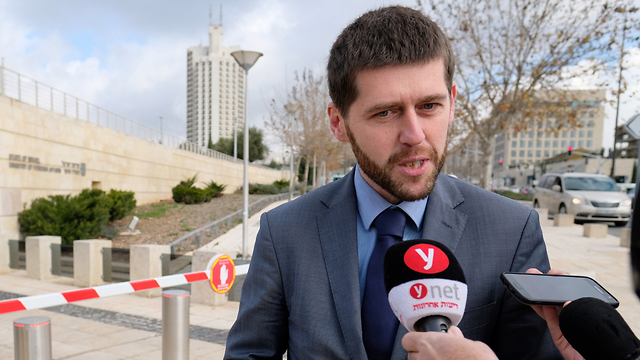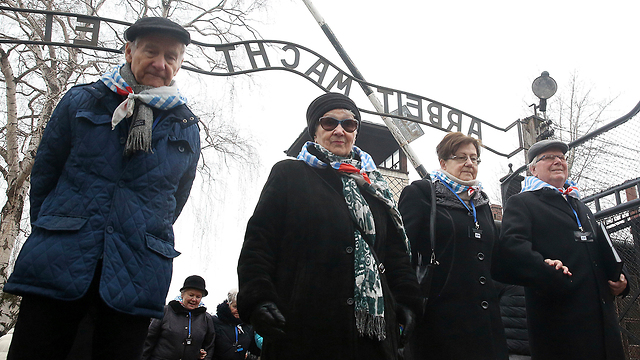

Netanyahu, Polish PM agree to hold dialogue on death camp bill
Speaking on bill outlawing references to 'Polish death camps,' PM Netanyahu and Polish PM Morawiecki speak by phone, agree for two countries to open immediate dialogue in order to reach understandings regarding bill; despite talks, Netanyahu says in Cabinet meeting, 'No tolerance for the distortion of the truth, the rewriting of history and the denial of the Holocaust.'
Prime Minister Benjamin Netanyahu said Sunday night that Israel and Poland have agreed to hold talks seeking to resolve the uproar over proposed Polish legislation that would outlaw blaming Poland for any crimes committed during the Holocaust.
Netanyahu then spoke by phone with Polish Prime Minister Mateusz Morawiecki late Sunday.
"The two agreed that teams from the two countries would open an immediate dialogue in order to try to reach understandings regarding the legislation," Netanyahu's office said in a statement.

The prime minister said at his weekly Cabinet meeting earlier Sunday that Israel has "no tolerance for the distortion of the truth, the rewriting of history and the denial of the Holocaust."
The lower house of the Polish parliament's bill calls for prison time for referring to "Polish death camps" and criminalizes the mention of Polish complicity.
The bill still needs approval from Poland's Senate and president. Still, it marks a dramatic step by the nationalist government to enforce its official stance that the vast majority in Poland—a country that was terrorized by Nazi Germany's occupation—acted heroically under those conditions. Historians say many Poles collaborated with the Nazis and committed heinous crimes.
The bill has sparked outrage in Israel and suddenly raised tensions with a close European ally.
On Sunday, the Foreign Ministry summoned Poland's deputy ambassador, Piotr Kozłowski, to express Israel's opposition to the bill.

After a 15 minute meeting with European Director Rodica Radian-Gordon and Director of the Department for Jewish Communities Akiva Tor, the Polish deputy ambassador stressed to reporters that "The law's intent is by no means to whitewash history, but to safeguard it and the truth about the Holocaust, as well as to prevent its distortion."
Yesh Atid Chairman Yair Lapid, for his part, got into a Twitter feud with the Polish Embassy in Tel Aviv after he posted his strong condemnation of the bill, which he claimed "tries to deny Polish complicity in the Holocaust."
"It was conceived in Germany but hundreds of thousands of Jews were murdered without ever meeting a German soldier. There were Polish death camps and no law can ever change that," Lapid wrote, to which the embassy replied that the intention of the bill "is not to 'whitewash' the past, but to protect the truth against such slander."
"Your unsupportable claims show how badly Holocaust education is needed, even here in Israel," the embassy slammed Lapid.
A Foreign Affairs Ministry source also weighed in on the controversy Saturday, and said, "Beyond the fact that the timing of the Polish bill was lamentable, it should honestly be said that its contents are mostly accurate—the death camps were not Polish."

"Before Israeli politicians go running to microphones, they should read the bill's language. It does not deny the Holocaust. It does not say there weren't any Poles who slaughtered Jews. It does not say that Poles are not worthy of denunciation for their part in murdering Jews. What it does say is the truth: that the death camps were not Polish but German, period. Germany is responsible for the Holocaust," the source stated.
The World Jewish Congress (WJC) voiced its own vehement objection to the bill Sunday night, calling it "an act of historical obfuscation and an attack on democracy."
WJC CEO Robert Singer said, "Poles are understandably sensitive when Nazi annihilation and concentration camps are referred to as 'Polish,' simply due to their location on Polish soil, and they want it to be clear that Germans, not Poles, were responsible for establishing and maintaining these factories of death in which millions of Jews were murdered during the Holocaust."
Singer also noted that more than 70,000 non-Jewish Poles were also estimated to have perished at Auschwitz alone.















